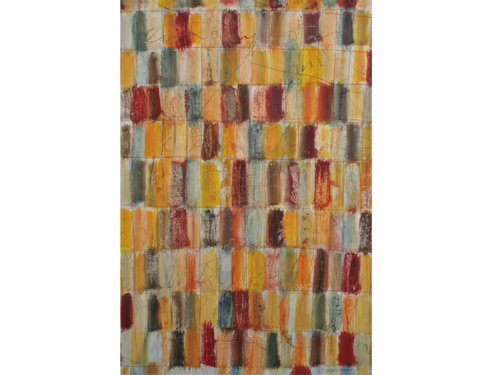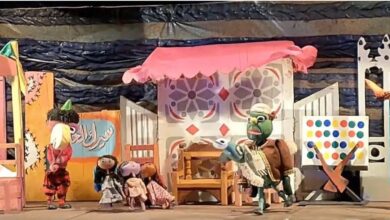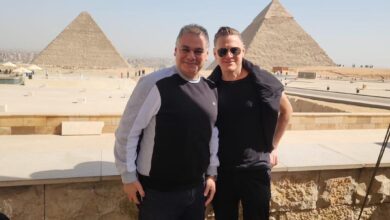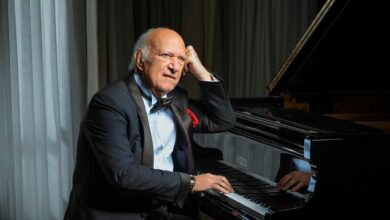
The 20th Arab Music Festival and Conference opened Friday evening at the Cairo Opera House with a dramatic pageant of over-the-top nationalism, themed around the 2011 revolutions in the Arab world. The show was a flashy, exhilarating spectacle featuring a full orchestra and choirs (occasionally even a children’s one), with high profile soloists performing classic patriotic songs from across the Arab world, backed up by troops of dancers.
Opening night found the Opera House lobby with glitz and glamour to spare, filled with Cairenes dressed in their Opera-going finest, amid a sea of flashing lights and television cameras.
Last year’s Arab Music Festival was themed around the life and work of iconic Egyptian singer Abdel Halim Hafez, creating a sense of nostalgia for the past and the glory days of Arab classical music. This year’s opening presentation featured music from the same era, but repackaged with a distinct change in tone, one that signified the triumph of revolution and the persisting sense of collective accomplishment as Egypt and its neighbors trudge their way through difficult political transitions.
The opening concert was structured to showcase music and performers from the stand-out revolutionary nations of 2011: Tunisia, Egypt, Libya, Yemen, and Syria, organized roughly according to the chronological order in which each revolution began.
Infusing the performance with the dramatic backdrop of revolution, the concert featured fast-paced slide shows of photographs from street protests to introduce each country, backed by a driving soundtrack of cinematic music in the vein of John Williams.
While the festival is officially themed “Arab Spring,” as an event devoted to classical Arab music, the concert harkened back to the genre’s heyday of the 1950s and 1960s, translating a theme of revolution into a theme of pan-Arabism and national patriotism.
However, there was one recently written song inspired directly by the revolution in Libya. “God Save the Revolution of Benghazi” is a proper revolutionary anthem, written, composed, and sung by Libyan musician Yehia Abdallah Lakhashy. Lakhashy performed in traditional dress: a long tunic, vest, and round red cap. The song began with a slow mournful solo, but soon gave way to flashing lights and beating drums, a raucous tune impressively consistent with the other, older songs featured throughout the concert.
A quick survey of the titles in the program gives a sense of the show’s tone. The opener “The Arab Nation” was followed by “Green Tunisia,” performed by Tunisian icon Suma, and the latter program included “I pray for Egypt” and “I love you Levant,” classic odes to places in the region. Other highlights included classic songs by legendary Egyptian composer Mohamed Abdel Wahab, such as “The Freedom Anthem,” which was performed by singer Hany Kamar, and “The Voice of the Masses.”
The musical program was interspersed with Egyptian poet Gamal Bekheit’s impassioned narration touching on various aspects of Arabic cultural heritage. The audience received his performance with enthusiasm.
Similar to last year's festival, the performance culminated in a final all-cast rendition of the, “By its Sky and its Earth,” a classic anthem to pan-Arabism by Kamal al-Tawil with words by the Egyptian colloquial poet Abdel Rahman al-Abnoudy. The song evoked clapping and singing along from the audience, and was a culminating moment of an impressive spectacle, complete with singing children and the swaying flags of all the Arab nations.
As part of the festival’s annual tradition, Abdel Moneim Kamel, the Opera House director and chairman of the National Cultural Center honored 11 composers, musicians, poets and media people who have enriched and revived the Arab music tradition throughout their careers. The awardees included composer Ezz al-Din Hosny and poet Bahgat Kamar.
The 2011 Arab Music Festival and Conference continues until 20 November with performances at the Opera House theaters in Cairo, Alexandria and Damanhour. Among the much anticipated shows is a performance tonight in Alexandria by Moroccan singer Fouad Zabady and Lebanese singer Jihad Akil, a tribute night to Egyptian music icon Om Kalthoum on 17 November at the Main Theater of the Cairo Opera House, as well as a performance by Algerian singer Follat al-Omr in Damanhour on 18 November.




